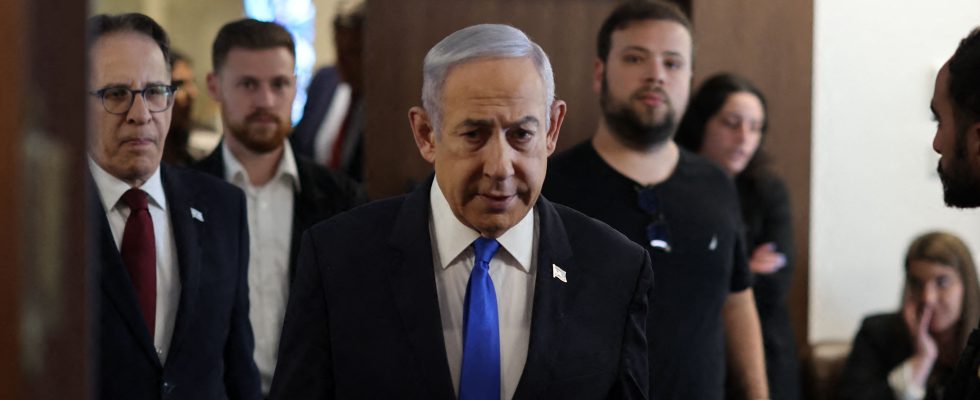The swords of Damocles are multiplying above the head of Benjamin Netanyahu. So much so that, according to several sources, “a feeling of viral panic” has gripped the Prime Minister’s office in recent days. First threat, and not the least: the International Criminal Court (ICC) is reportedly preparing to issue arrest warrants against several officials of the Jewish state, including Netanyahu, for having orchestrated a famine in the Gaza Strip. This decision would be a huge slap in the face for the Prime Minister who, during each electoral campaign, prides himself on his proximity to the greats of this world and would find himself banned from traveling to Europe, under penalty of arrest. “For Israel, it would be a political earthquake like our country has never known,” summarizes columnist Ben Caspit In Maariv.
Another source of concern for Israel: according to the Axios information site, always well informed about the corridors of Israeli power, the United States interrupted an arms delivery to the Jewish state in early May, after an extremely tense conversation between Netanyahu and Secretary of State Antony Blinken in Jerusalem. The head of American diplomacy warned the Israeli Prime Minister that the United States would publicly oppose an Israeli offensive on Rafah, in the south of the Gaza Strip, where 1.5 million Palestinian civilians are refugees.
On May 5, during a Holocaust remembrance ceremony, Netanyahu responded, in his own way, to pressure from the Biden administration: “During the Holocaust, great international leaders stood idly by. The first lesson of the Holocaust ‘Holocaust therefore is this: if we do not defend ourselves, no one will come to defend us. If we must be alone, then we will be alone.’ The next day, Israel asked civilians to speed up their evacuation from Rafah, suggesting that its military operation would be imminent.
International isolation anticipated by Israeli leaders
Each day of war increases Israel’s isolation on the international scene, with Europeans demanding, for several months now, a ceasefire in Gaza and an American administration exasperated by the Netanyahu government. This scenario, feared by everyone in Israel, is however not a surprise for the Israeli establishment. In April 2022, two months after the invasion of Ukraine, a senior official of the Jewish state explained to us that Israel was directly opposed to sanctions against Russia because the country feared suffering the same fate in the event of war. regional. “The Russian case sets a precedent,” he warned. “When you isolate a country for moral reasons, there is no reason to stop at Russia alone: all those who are going to wage wars, just or unjust, will now be threatened by possible Western sanctions. This will be the case for Israel.
From the day after October 7, Israeli leaders knew that Western support for their armed response in the Gaza Strip would be limited in time. “International legitimacy remains very important for Israel, but this is not a simple operation in the Gaza Strip or a terrorist threat in the West Bank: this is an existential war for Israel, so little international legitimacy matters, says Kobi Michael, specialist in Defense issues at the Institute for National Security Studies in Tel Aviv. The State of Israel must do what it has to do in order to regain its security…”
For Netanyahu and his far-right allies, this amounts to rejecting any concession to Hamas, while around a hundred Israeli hostages remain in the hands of the terrorist group. At the end of April, the hope of a 40-day truce and the release of captives was taking shape, but negotiations seem to have stalled again after Netanyahu left on May 4, assuring that “the end of the war [ne peut pas] part of the agreement”. “The price to pay is heavy for all camps, but Israel has no other option”, estimates Kobi Michael. On the other hand, Hamas does not seem in a hurry to obtain a ceasefire, the majority of its leaders being outside the Gaza Strip “It is Hamas which is rejecting the release of our hostages, assured Netanyahu in a press release. We are doing everything possible to free them, that is our priority.”
The Al-Jazeera ban and the message to Qatar
In this context, the banning of Al-Jazeera in Israel and the raid carried out on the channel’s premises in Jerusalem on May 5 raise the question: what interest does the Israeli government have in targeting the symbol today? national of Qatar, main actor in negotiations with Hamas? Israel claims that closing the channel, which extensively covers events in the Gaza Strip, responds to national security imperatives, but the argument struggles to convince after seven months of conflict. By censoring a major international channel, the Netanyahu government can only accentuate the accusations of authoritarianism aimed at it, without stopping the criticism, both external and internal. Even Benny Gantz, a member of the war cabinet, recognized that “the timing of this ban is not ideal” and risks jeopardizing the rescue of Israeli hostages.
Faced with this strategy, dictated by the most extreme wing of the government, civil society came out massively in major Israeli cities on Saturday May 4. In addition to the traditional demands – the release of the hostages and the resignation of Netanyahu – the tens of thousands of demonstrators are making a new demand heard more and more loudly: that of a cease-fire in Gaza. An imperative to avoid finding yourself banned from the international scene.
.
